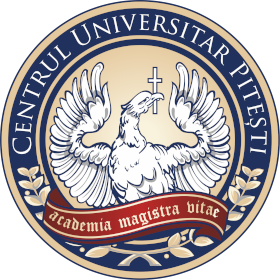- Faculties
- Facultatea de Științe ale Educatiei, Științe Sociale şi Psihologie
- Departamentul Psihologie și Științe ale Comunicării si Asistență socială
- Programe de licență DPSCAS
- Psihologie
STUDY PROGRAM - PSYCHOLOGY
Legal framework for organizing and running of the Psychology Study Program
The Psychology Study Program has been operating at the University of Pitești starting from the 2003-2004 academic year, under the coordination of the Department of Psychology, History and Communication Sciences, and through collaboration with other departments of the University of Pitești: Department of Medical Assistance and Physiotherapy, Department of Applied Foreign Language, Department of Physical and Sports Education.
The Psychology Specialization obtained accreditation according to the ARACIS Council Decision dated 24.06.2010, based on GD no. 966 / 1.10.2011.
At the same time, the Master Degree in Clinical Psychology: evaluation and intervention was established, enjoying of a real success among graduates of the Psychology Licensing Program. The Master Degree was accredited according to the ARACIS Council Decision dated 23.06.2011, through MO no. 4945 / 9.08.2012.
PLAN OF EDUCATION - UNIVERSITY CYCLE 2018-2021
DISCIPLINE FILE - LICENSE PSYCHOLOGY
YEAR I
Psychological statistics and computerized data processing I
YEAR II
Psychological statistics and computerized data processing II
Applied Psychology in Educational institutions
YEAR III
Legal psychology
Psychological Forensics
Cognitive psychology
The mission of the Psychology Study Program
The Psychology Specialization is part of the field of Psychology License. Through the Curriculum, the analytical programs and the objectives it proposes aim to provide basic professional training in the main professional areas of Psychology (Clinical Psychology, Educational psychology, Labor Psychology, etc.).
This mission is reflected in the Curriculum so that curricular compatibility with content with other faculties in the European Union is achieved.
On the labor market, the profession of Psychologist can be found in many sectors of activity and in a multitude of organizations such as public institutions (in Education: school counselor or Psychology professor, in Public Health and Public Health clinics: Psychologist or Psychotherapist, in specialized institutions in the field of Defense and Public Order: Military Psychologist etc.) or private organizations (economic organizations, non-profit organizations: industrial-organizational Psychologist, etc.).
Professionalization as a Psychotherapist involves, in addition to basic studies in Psychology or related fields (social work, Medicine-Psychiatry, Sociology), a long-term training (3-4 year) offered by various Psychotherapy schools accredited by the Romanian College of Psychologists.
The practice of the Psychologist profession is based on a Certificate of free practice issued by the Romanian College of Psychologists, the institution that manages, according to the legal regulations in force, the professional services offered by the Romanian Psychologists.
The specific objectives of the Psychology study program are to develop the knowledge and skills needed to acquire professional skills.
The training process of future specialists is designed to achieve the following objectives, in line with the provisions of the National Qualifications Framework for Higher Education developed in 2011:
acquiring and deepening information in the field of Psychology and behavioral sciences;
the formation of a specialized scientific language, based on modern concepts and modern theories;
acquiring the methodological approach specific to the research of mental processes and social phenomena;
developing the knowledge and interpersonal skills;
acquiring the main paradigms, methods of thinking and interpretation of personality and human behavior;
knowledge and application of the latest methods and techniques of Psychological assessment of the individual, group and organizations, Psychological investigation, based on psychometric instruments and statistical models, on the use of computer programs for processing and analysis of data;
acquiring the capacity to identify, analyze and solve social problems and conflicts in organizations and communities;
developing basic skills for Psychological interventions in the applied fields of Psychology;
acquiring the specific deontological principles in practicing the profession of Psychologist;
forming new spirits open to dialogue and concerned about their civic responsibilities.
The professional competences acquired by graduates of the Psychology Study Program are:
Operating with fundamental concepts in the field of Psychology,
Designing and implementing a research project in Psychology,
Critical evaluation of problematic situations and possible solutions in Psychology,
Psychological evaluation of the individual, group and organization,
Designing and realization of Psychological interventions,
Relationship and interpersonal communication specific to the field of Psychology.
Transversal competencies:
• Exercise of professional duties according to the specific deontological principles in the exercise of the profession,
• Application of efficient multidisciplinary team work techniques on various hierarchical levels,
• Self-assessment of the needs of continuous training in order to adapt the professional skills to the dynamics of the social context.
At the end of the three-year Bachelor's degree Program, graduates receive the Bachelor's Degree in Psychology and the skills required to enter professional supervision programs, in accordance with the provisions of Law no.213 and the Regulations of the Romanian College of Psychologists.
The supervision, in order to obtain the Certificate of autonomous free practice, is accomplished through Masters studies, postgraduate courses or professional training offered by institutions approved by the Romanian College of Psychologists.
Areas of competence acquired in the Faculty allow practicing the profession of Psychologist in the following specializations:
1. Psychologist in the field of work, organizational, transport and services Psychology:
Individual cabinet for Labor Psychology, Transport and Services for Psychological evaluation and testing at employment or on a periodical basis;
Cabinets for Psychology in polyclinics;
Psychologist in industrial, financial and banking organizations;
Psychologist in Human Resources;
Psychologist specialized in Sports Psychology;
Psychologist adviser in governmental or non-governmental organizations;
Psychologist in the Judiciary, Forensic Psychologist, Psychologist in Penitentiaries.
2. Psychologist in Psychotherapy, Clinical Psychology and Psychological counseling:
Individual Psychotherapy and Psychological counseling;
Clinical Psychologist in hospitals, clinics, nursing homes, recovery clinics;
Psychologist counselor in clinics and Psychology offices;
3. Psychologist in Education:
Psychologist teacher in highschool and University Education;
School Psychologist in School Psychology;
Psychologist specialized in school and vocational counseling in Psychology cabinets in schools, highschools, Universities or individual cabinets.
4. Psychologist in the field of National Security.
Graduates of the Bachelor's degree program will access the following occupations according to the "Occupations Classification in Romania" - ISCO-08: Assistant Professor - 231001; Associate Professor - 231002; Expert training centers - 231003; Lecturer - 231004; Professor - 231006; Labor and Unemployment Counselor - 241201; Expert Labor and Unemployment - 241202; Specialized labor and unemployment inspector - 241203; Occupational Safety Officer - 241204; Trainer - 241205; Specialist for labor and unemployment - 241206; Trainer of trainers - 241207; Career guidance counselor - 241208; Consultant in the field of labor - 241209; Labor Market Analyst - 241210; Employee recruitment / integration analyst - 241211; Reconversion consultant - personal mobility - 241213; Consultant working conditions - 241214; Specialist Qualification Systems - 241215; Human Resources Specialist - 241216; Organizer / designer / training consultant - 241217; Professional Inspector Professional Training, Evaluation and Selection - 241218; Occupational competence assessor - 241219; Specialist in Occupational Safety and Health - 241220; Coordinator for Occupational Safety and Health (Higher Education) - 241221; Extrajudicial technical expert - 241801; Specialist marketing - 241921; Assistant / Functional Assistant (Supplementary Studies) - 241924; Social Relations Specialist - 241925; Commercial Company Administrator - 241939; Psychologist in clinical Psychology - 244501; Psychologist in Psychological counseling specialty - 244502; Psychologist in the field of Psychotherapy - 244503; Psychologist in the field of work and organizational Psychology - 244504; Psychologist in Transportation Psychology - 244505; Psychologist in the field of Applied Psychology in services - 244506; Psychologist in the field of Educational Psychology, school and vocational counseling - 244507; Psychologist specializing in Psycho-pedagogy - 244508; Psychologist in the field of Psychology in the field of National Security - 244509; Psychologist in the field of Judicial Psychology - evaluation of simulated behavior by the polygraph technique - 244510; Psychologist - 244511; Psychologist - 244512; Expert polygraph - 244513; School Psychologist - 244514; School Advisor - 244604; Doping Control Officer - 244605; Art-therapist - 244606; Public Relations Specialist - 244701; Marketing specialist - 244703; Cameral Consultant - 244705; Spokesperson - 244706; Counselor for the Youth - 244801; Researcher in Psychology - 258501; Assistant Research in Psychology - 258502; Researcher in Special Psychopedagogy - 258503; Assistant Research Special Psychopedagogy - 258504; Occupational therapist - 258505.
The knowledge, skills and competences gained during the faculty allowed graduates to engage in the labor market, develop their own business, continue their studies in the next cycle and learn permanently.
The teaching staff of the Psychology specialty
The staff of the Psychology undergraduate program consists of 19 University professors: 2 teachers, 4 conference speakers, 10 lecturers, 3 assistants.
Out of the 19 teachers with activities in the Psychology Study Program, there are 17 titular teachers and 2 associate teachers from four Departments of the University of Pitești: Department of Psychology, History and Communication Sciences, Department of Medical Assistance and Physical Therapy, Department of Psychology, Applied Foreign Languages, Department of Physical and Sports Education.
The discipline holders own the scientific title of Doctor or they are PhD students in the disciplines of the occupied positions and the other staff have initial training and competences in the fields of the studied disciplines. All teaching staff at the University of Pitești, with activities within the specialization, have an attested Pedagogical training.
The discipline holders have developed courses, guidance of works / projects or other works necessary for carrying out the educational process, covering the analytical programs of the disciplines in the post.
The content of the educational process
The education process for the 3-year PSYCHOLOGY Study Program is based on the Curriculum. This plan has been designed to meet the criteria of ARACIS standards.
To make visits and internships, the University has signed firm Agreements of collaboration with organizations from Argeș County.
Admission
In the Psychology Study Program, the recruitment of the students is done through admission procedures. Over the last six years, the number of students enrolled in the 1st year of Psychology ranged from 83 to 100. For admission in the first academic year 2016-2017, the classification method for admission was the following:
50% average at the Baccalaureate exam and
50% grade obtained in the discipline Psychology / Sociology / Philosophy / Logic / Economics / Mathematics / Biology / Romanian Language at the Baccalaureate Exam.








